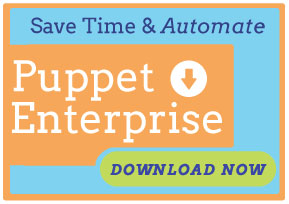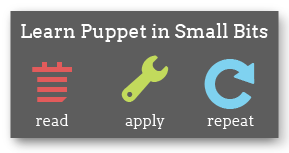Puppet Labs Documentation
Welcome to the Puppet Labs documentation site. The documentation posted here is also available as a set of PDFs, which can be found here. You can also download the current version of this entire website as a zipped archive; unzip it and follow the instructions in the README.txt file to view the site offline.
Puppet
Puppet manages your servers: you describe machine configurations in an easy-to-read declarative language, and Puppet will bring your systems into the desired state and keep them there.
See the index for Puppet’s documentation here, or go directly to one of the most popular pages:
- The Learning Puppet series is a guided tutorial for new users, which includes a free VM to run exercises on and experiment with. Go from “What’s that?” to “I can do it” in just a few hours.
- The installation guide can help you install and configure the current open-source Puppet releases.
- The Puppet 3 Reference Manual
- The Puppet 2.7 Reference Manual
- The latest type reference covers all of the built-in resource types and their available attributes. New users should start elsewhere, but experienced users will spend most of their time in this one page.
- The glossary explains the terminology you’ll encounter when reading about Puppet.
Puppet Enterprise
Puppet Enterprise is Puppet with more, including professional support, a production-grade puppet master stack, a web console for analyzing reports and controlling your infrastructure, powerful orchestration features, and cloud provisioning tools.
Nearly all of the main Puppet documentation also applies to Puppet Enterprise. For details about PE’s extra features and slightly different run environment, see the current Puppet Enterprise user’s guide, or go directly to:
- The system requirements
- The installation instructions or the upgrade instructions
- The quick start guide, which walks through building and managing a small proof-of-concept deployment.
- The deployment guide has a ton of information to help you set up and deploy Puppet Enterprise in accordance with the best practices and methods used by Puppet Labs’ professional services engineers.
- The PE download page
The current version of PE is 2.8. Documentation for previous versions can be found here.
MCollective
MCollective is a powerful orchestration framework. Run actions on thousands of servers simultaneously, using existing plugins or writing your own.
See the MCollective docs index, or go directly to:
- The terminology glossary
- The installation instructions
- The configuration guide
- The guide to writing new agent plugins
- The release notes
Note: MCollective is included with Puppet Enterprise, and new agent plugins will appear in the console’s live management controls.
Puppet Dashboard
Puppet Dashboard is an open source web console for Puppet, which can analyze reports, browse inventory data, and assign classes to nodes.
See the Dashboard 1.2 manual, or go directly to:
Note: Puppet Enterprise’s console is based on Puppet Dashboard, and extends it with extra features. PE users should see the PE documentation instead of the Dashboard documentation.
PuppetDB
PuppetDB is the fast, scalable, and reliable data warehouse for Puppet. It caches data generated by Puppet, and gives you advanced features at awesome speed with a powerful API.
See the manual for the latest version of PuppetDB, or go directly to:
Documentation for other versions of PuppetDB can be found here.
Hiera
Hiera is a key/value lookup tool for configuration data, built to make Puppet better and let you set node-specific data without repeating yourself. Hiera support is built into Puppet 3, and is available as an add-on for Puppet 2.7.
See the Hiera 1 manual, or go directly to:
- The installation instructions
- The config file reference
- Info about hierarchies
- How to write data sources
- Using Hiera with Puppet
- Using Hiera from the command line
Facter
Facter is Puppet’s cross-platform system profiling library. It discovers and reports per-node facts, which are available in your Puppet manifests as variables.
- The list of core facts lists and describes every built-in fact that ships with Facter.
- The custom facts guide explains how to write and distribute your own facts.
Community
Puppet has a large community and many resources for users.
- Community Guidelines and Code of Conduct — General info about how to navigate our community and get help.
- Yum and Apt repositories — Easily install Puppet Labs’s software on the most popular Linux distributions.
- The Puppet Forge — A bazaar of community-built Puppet modules, for managing everything from Apt repos to ZFS.
- Redmine Workflow for Puppet Open-Source Projects — Info about how the Puppet projects use their issue tracker, and how you can help.
- Trivial Patch Exemption Policy — Details about which contributions are exempted from our contributor agreement.
Help Improve This Site
These documents belong to the community and are licensed under the Creative Commons. You can help improve them!

This work is licensed under a Creative Commons Attribution-Share Alike 3.0 United States License.
For suggestions or minor corrections, just email faq@puppetlabs.com. To contribute text or make larger-scale suggestions, see the instructions for contributing. If you would like to submit your own content, you can fork the project on github, make changes, and send us a pull request. See the README files in the project for more information about how to generate and view a copy of the website.
Documentation Version
This release of the documentation was generated from revision 7ca1f1ced9d4c31b85135e177e1ca1d9bf4285c5 of the puppet-docs Git repo on April 25, 2013.
Recent commits to the puppet-docs repo:
- Fix cut & paste issues
- Add missing topics to puppetdb index
- Typo in highlight: 'yaml' not 'ymal'
- Add sentence linking to CONTRIBUTING.md when we need a pull request
- Make instructions consistent about splitting console and master roles
- Update PE cloud provisioner docs to specify --install-script=puppet-enterprise
- Fixing a missed reference to PE 2.8.
- fix quotes
- Add documentation for boolean params
- Update facter index to include 1.7


